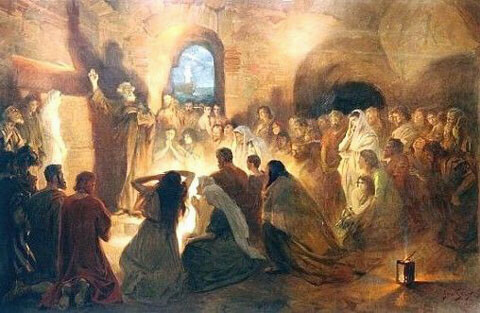Forgiveness, Mercy and Grace are the cornerstones of the Christian message. However, forgiveness becomes dangerous when gross, moral sin has taken place and forgiveness is used as a weapon for silencing victims and a cloak to coverup suspicion, unwanted attention and accountability.
This is my first step of exposing such dangerous practices, dangerous forgiveness and coverup, and I hope this gains traction, attention and spreads like wild fire.
We are seeing an onslaught of sexual impurity in churches around the globe. We in America see it daily in the news. In my anecdotal studies I have found that nearly 30%+ of sexual abuse/assault involving a minor comes from Christian leaders with authority over that minor, or in Christian homes with fundamental, authoritarian beliefs. As someone who claims the Christian Faith, this is something I don’t take lightly or with joy.
Jesus Christ was quick to forgive. To show mercy, and grace, and inspire change in his followers. As Christians, we also believe that change cannot take place without the grace and power of the Holy Spirit. To point, Christ is quoted in Matthew 6:14 as saying, “For if you forgive men their trespasses, your heavenly father will also forgive you.”
This is a beautiful quote and is seen again with the Samaritan woman at Jacob’s well in John 4, and the adulteress in John 8. But even in these encounters, Jesus never silenced a victim or whitewashed over sin. The Samaritan woman was commanded to Worship and follow Christ and the adulteress was told to sin no more. We are commanded to forgive, and we should be fast and free to forgive, But…
When Forgiveness Becomes Dangerous
In recent news, the hall of fame family of the United Pentecostal Church, International, the Ensey family has been shaken. The son, Jonathan R. Ensey was recently sentenced to eight to twelve years in a federal penitentiary for sexual misconduct with a minor in his church.
The crux of the story, in all it’s gruesome twists, is that the father, Pastor of Living Way Church in Conroe, Texas, Randy Ensey covered up the story. The parents of the victim alerted Randy Ensey to the inappropriate behavior and he did nothing. It wasn’t until the parents, and bless them for having the courage, took it to the police that things unfolded from there.
In the news story linked here, you’ll read, as you do in almost all of these cases, how the congregation of the Living Way Church packed the courtroom in defense of this man.
I’ve seen this type of behavior, multiple times, first hand. And in the past 30 days, this type of dangerous forgiveness has sprung up in another Pentecostal church. My old home town church. Abundant Life Pentecostal Church.
Abundant Life Pentecostal Church, located in McMinnville, Oregon has a long history of cover ups. During my 15 years there I saw the pastors ‘pray’ over child abuse instead of reporting it authorities. I’ve been made aware of the private school supervisor checking the under garments of under-age girls attending school to make sure they were ‘approved’.
While that was second hand information, I sat through years of their required ‘Family Class’ as my child was in the same school. In that class they taught at what ages your female child could wear certain kinds of underwear and they took that very seriously.
I’ve seen the leadership secret in a man through the back doors and have him sit in the ‘upper room’, above the baptistry, who had a restraining order against him for domestic abuse, while his victim sat in the congregation, just to make sure he was in church.
The then pastor, William “Bill” Davies and his son (now the pastor) Matthew Davies were found guilty of violating child labor laws by using church youth in their commercial landscaping business without pay and were ordered by the Bureau of Labor and Industries to pay restitution.
When William Davies demonstrably defamed the man responsible for reporting their acts during a church service, a service in which he demanded the entire congregation to turn off their phones and to not record what he was about to say, they were sued for defamation and paid an undisclosed amount to settle. All thanks to a few brave souls who saw the red-flag of the pastoral demands and recorded the service.
During this trial and to this day, members of the congregation blamed ‘Satan’ for attacking their man of God and still defend his innocence in all cases, just as we saw in the Ensey case and many more like it. And now, this forgiveness becomes dangerous again.
A Predator in the Classroom
About 30 days ago I found out that a young man who had been suspected, charged, and convicted of sexually assaulting his young sister (circa 2013-2015) is now an appointed (by the Davies) Sunday School Teacher at Abundant Life Pentecostal Church, in McMinnville, Oregon, for the 9-12 year old class, called the Amplified Class. You can see the churches website here: www.alpcministries.org. (2023 Edit: That website is no longer in operation, so an archived link is given. The new link is https://alpc.church.)
This young man was 15-16 at the time the abuse started and the sister was 7. By public accounts, the abuse spanned about two years until the young man was finally arrested, tried and then sent away. The victim, and her family, still attend Abundant Life Pentecostal.
I can’t speak to all the details and dates as I don’t want anything quoted to be found untrue. What is true, is that this young man was forgiven, and welcomed back in to the church with open arms upon his release.
His victim is now a silenced member of the church. He was given a fancy church wedding while she is told to keep things to herself and forgive. And he is now a Sunday School teacher, overseeing children the same age that his victim was.
Forgiveness Or Moral Failure?
Is this forgiveness, or a stumbling block? Is this tempting the Lord, thy God, or restoration?
The reason I am not naming the young man is because in this instance, the moral failure is on the now pastor of Abundant Life Pentecostal Church, Matthew Davies and the churches ‘board of elders’. Should the young man distance himself from such a thing? Absolutely. And if he was to harm another child, he should be held accountable.
Yet and more-so, in these fundamental church systems such as Oneness Pentecostalism, and in the United Pentecostal Church, they have such a delusional view of forgiveness that they would believe it safe to put a young man who molested a little girl, in a classroom of little girls, the age of his previous victim, so long as he obeys them.
And should another child be hurt, I believe the moral failure, and legal ramifications, should fall on the leadership of the church for making this bad of a decision, every bit as much as on the young man, should he recidivate.
There is a deep rooted command in Christian faith to forgive, but not to tempt. To restore, but not to make a room for evil. Equal to forgiveness is the command to not put a stumbling block before your brother. For me now, being knowledgeable of this circumstance, as much as I forgive the previous trespass, I cannot ignore the potential for harm and be silent.
If any harm comes to another child, I equally feel I would be morally responsible should I not speak out. Furthermore, this was the classroom that my 9 year old daughter was attending. How dare they, the leadership of that church, put my own daughter at great risk to satisfy their twisted ideals?
They truly believe if you shout enough, speak in tongues enough, and attend enough, you are ‘Ok’. Did that save Jonathan Ensey and his victim? It did not, and I’ll not sit idly by watching and waiting for another news story to pop up.
Men and Brethren, What Should We Do?
I do not want to be seen as inciting hate mail, hate speech, defamation, or any other inappropriate behavior. If any feel so inclined to contact this church and demand answers or tell them how terrible of a choice this is, you are free to do so. I will personally be publishing more information as I cannot sit idly by while children are put in harms way but I can only share factual information.
My family no longer attends this church, I pulled that plug after they wantonly endangered my daughter. But there are dozens, potentially hundreds of other children, both members of the church and bused in ‘bus kids’ in the Sunday school at risk.
I also feel inclined to say that it is possible that this young man’s record is expunged. He may have been tried as a child and not as an adult and thus, legally, there is no law being violated. And if that is the case, I would forgive, but never trust him again. No way should he be attending the same church as his victim.
There is tremendous boundaries of trust, responsibility, wisdom and discernment being recklessly abandoned for the sake of their precious doctrines even if not legal boundaries.
I want to ask the pastor, Matthew Davies, “What would you do if it was your daughter?” and other members of the McMinnville, OR community should be asking him the same thing.
Abundant Life Pentecostal Church
1145 SW Wallace Road
McMinnville, OR 97128
503-472-1585
Pastor Matthew Davies
matt@alpcministries.org
********
Shop at our Amazon store! As an Amazon Influencer, this website earns from qualifying purchases.








